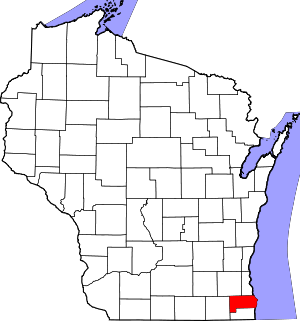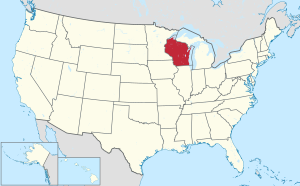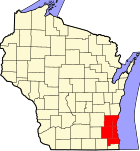Racine County, Wisconsin
Racine County | |
|---|---|
 | |
 Location within the U.S. state of Wisconsin | |
 Wisconsin's location within the U.S. | |
| Coordinates: 42°47′N 87°46′W / 42.78°N 87.76°W | |
| Country | |
| State | |
| Founded | December 7, 1836 |
| Seat | Racine |
| Largest city | Racine |
| Area | |
• Total | 792 sq mi (2,050 km2) |
| • Land | 333 sq mi (860 km2) |
| • Water | 460 sq mi (1,200 km2) 58% |
| Population | |
• Total | 197,727 |
• Estimate (2023) | 196,613 |
| • Density | 594.4/sq mi (229.5/km2) |
| Time zone | UTC−6 (Central) |
| • Summer (DST) | UTC−5 (CDT) |
| Congressional district | 1st |
| Website | www |
Racine County (/rəˈsiːn, reɪ-/ ⓘ rə-SEEN, ray-) is a county in southeastern Wisconsin. As of the 2020 census, its population was 197,727,[1] making it Wisconsin's fifth-most populous county. Its county seat is Racine.[2] The county was founded in 1836, then a part of the Wisconsin Territory. Racine County comprises the Racine metropolitan statistical area. This area is part of the Milwaukee-Racine-Waukesha combined statistical area.[3] According to the U.S. Census Bureau, the county has an area of 792 square miles (2,050 km2), of which 333 square miles (860 km2) is land and 460 square miles (1,200 km2) (58%) is water.[4] The county's unemployment rate was 5.6% in June 2021.[5]
History
[edit]The Potawatomi people occupied the area of Racine County until European settlement. The Wisconsin Territory legislature established Racine County in 1836, separating it from Milwaukee County. Racine County originally extended to Wisconsin's southern border and encompassed the land that is now Kenosha County, Wisconsin. Kenosha County was created as a separate entity in 1850.[6]
Geography
[edit]- Milwaukee County (north)
- Ottawa County, Michigan (northeast across Lake Michigan)
- Allegan County, Michigan (southeast across Lake Michigan)
- Kenosha County (south)
- Walworth County (west)
- Waukesha County (northwest)
The Root River is the county's namesake.
Demographics
[edit]| Census | Pop. | Note | %± |
|---|---|---|---|
| 1840 | 3,475 | — | |
| 1850 | 14,973 | 330.9% | |
| 1860 | 21,360 | 42.7% | |
| 1870 | 26,740 | 25.2% | |
| 1880 | 30,922 | 15.6% | |
| 1890 | 36,268 | 17.3% | |
| 1900 | 45,644 | 25.9% | |
| 1910 | 57,424 | 25.8% | |
| 1920 | 78,961 | 37.5% | |
| 1930 | 90,217 | 14.3% | |
| 1940 | 94,047 | 4.2% | |
| 1950 | 109,585 | 16.5% | |
| 1960 | 141,781 | 29.4% | |
| 1970 | 170,838 | 20.5% | |
| 1980 | 173,132 | 1.3% | |
| 1990 | 175,034 | 1.1% | |
| 2000 | 188,831 | 7.9% | |
| 2010 | 195,408 | 3.5% | |
| 2020 | 197,727 | 1.2% | |
| U.S. Decennial Census[7] 1790–1960[8] 1900–1990[9] 1990–2000[10] 2010–2020[11] 2020 census[12] | |||
| Race / Ethnicity (NH = Non-Hispanic) | Pop 2000[13] | Pop 2010[14] | Pop 2020[15] | % 2000 | % 2010 | % 2020 |
|---|---|---|---|---|---|---|
| White alone (NH) | 150,238 | 145,414 | 135,333 | 79.56% | 74.42% | 68.44% |
| Black or African American alone (NH) | 19,441 | 21,212 | 22,531 | 10.30% | 10.86% | 11.40% |
| Native American or Alaska Native alone (NH) | 541 | 614 | 538 | 0.29% | 0.31% | 0.27% |
| Asian alone (NH) | 1,331 | 2,081 | 2,261 | 0.70% | 1.06% | 1.14% |
| Pacific Islander alone (NH) | 54 | 40 | 47 | 0.03% | 0.02% | 0.02% |
| Other race alone (NH) | 156 | 228 | 792 | 0.08% | 0.12% | 0.40% |
| Mixed race or Multiracial (NH) | 2,080 | 3,273 | 8,314 | 1.10% | 1.67% | 4.20% |
| Hispanic or Latino (any race) | 14,990 | 22,546 | 27,911 | 7.94% | 11.54% | 14.12% |
| Total | 188,831 | 195,408 | 197,727 | 100.00% | 100.00% | 100.00% |
2020 census
[edit]As of the census of 2020,[1] the population was 197,727. The population density was 594.4 people per square mile (229.5 people/km2). There were 84,490 housing units at an average density of 254.0 units per square mile (98.1 units/km2). The racial makeup of the county was 72.0% White, 11.8% Black or African American, 1.2% Asian, 0.5% Native American, 5.4% from other races, and 9.0% from two or more races. Ethnically, the population was 14.1% Hispanic or Latino of any race.
2000 census
[edit]As of the census[16] of 2000, there were 188,831 people, 70,819 households, and 49,856 families residing in the county. The population density was 567 people per square mile (219 people/km2). There were 74,718 housing units at an average density of 224 units per square mile (86 units/km2). The racial makeup of the county was 83.04% White, 10.47% Black or African American, 0.36% Native American, 0.72% Asian, 0.04% Pacific Islander, 3.69% from other races, and 1.67% from two or more races. 7.94% of the population were Hispanic or Latino of any race. 32.9% were of German, 7.4% Polish and 5.5% Irish ancestry.
There were 70,819 households, of which 34.5% had children under 18 living with them, 54.0% were married couples living together, 12.3% had a female householder with no husband present, and 29.6% were non-families. 24.5% of all households were made up of individuals, and 9.2% had someone living alone who was 65 or older. The average household size was 2.59 and the average family size was 3.09.
In the county, the population was spread out, with 27.0% under 18, 8.3% from 18 to 24, 29.9% from 25 to 44, 22.5% from 45 to 64, and 12.3% who were 65 or older. The median age was 36. For every 100 females there were 98.0 males. For every 100 females 18 and over, there were 95.5 males.
Transportation
[edit]Major highways
[edit]Railroads
[edit]Buses
[edit]Airports
[edit]- John H. Batten Airport (KRAC) serves the county and surrounding communities.
- Burlington Municipal Airport (KBUU) enhances county service.
- Cindy Guntly Memorial Airport (62C) enhances county service.
- Fox River Airport (96C) enhances county service.
- Sylvania Airport (C89) enhances county service.
Communities
[edit]

Cities
[edit]- Burlington (partly in Walworth County)
- Racine (county seat)
Villages
[edit]Towns
[edit]Census-designated places
[edit]- Bohners Lake (Town of Burlington)
- Browns Lake (Town of Burlington)
- Eagle Lake (Town of Dover)
- Tichigan (Town of Waterford)
- Wind Lake (Town of Norway)
Unincorporated communities
[edit]Ghost towns/neighborhoods
[edit]Government
[edit]
The County Board has 21 members, each elected from single-member districts.[17] The county executive is elected in a countywide vote. The county executive is Jonathan Delagrave. The Circuit Court is made up of ten judges, elected in countywide elections to six-year terms.
Politics
[edit]Racine County has been a bellwether county, having voted for the winning presidential candidate in 28 of the last 33 elections since 1896 despite its solidly Democratic county seat, Racine, Wisconsin. The only exceptions to this were when it voted for Charles Evans Hughes in 1916, Gerald Ford in 1976, Michael Dukakis in 1988, and Donald Trump in 2020.
| Year | Republican | Democratic | Third party(ies) | |||
|---|---|---|---|---|---|---|
| No. | % | No. | % | No. | % | |
| 2024 | 56,347 | 52.33% | 49,721 | 46.17% | 1,618 | 1.50% |
| 2020 | 54,479 | 51.18% | 50,159 | 47.12% | 1,813 | 1.70% |
| 2016 | 46,681 | 49.50% | 42,641 | 45.22% | 4,980 | 5.28% |
| 2012 | 49,347 | 47.74% | 53,008 | 51.28% | 1,009 | 0.98% |
| 2008 | 45,954 | 45.66% | 53,408 | 53.07% | 1,280 | 1.27% |
| 2004 | 52,456 | 51.65% | 48,229 | 47.48% | 884 | 0.87% |
| 2000 | 44,014 | 49.53% | 41,563 | 46.77% | 3,288 | 3.70% |
| 1996 | 30,107 | 38.81% | 38,567 | 49.72% | 8,894 | 11.47% |
| 1992 | 32,310 | 36.79% | 34,875 | 39.71% | 20,634 | 23.50% |
| 1988 | 36,342 | 47.42% | 39,631 | 51.72% | 658 | 0.86% |
| 1984 | 42,092 | 52.84% | 36,955 | 46.39% | 616 | 0.77% |
| 1980 | 39,683 | 49.76% | 33,565 | 42.09% | 6,494 | 8.14% |
| 1976 | 37,088 | 49.00% | 36,740 | 48.54% | 1,858 | 2.45% |
| 1972 | 38,490 | 56.41% | 27,778 | 40.71% | 1,968 | 2.88% |
| 1968 | 28,028 | 44.78% | 27,045 | 43.21% | 7,513 | 12.00% |
| 1964 | 21,434 | 36.14% | 37,785 | 63.71% | 87 | 0.15% |
| 1960 | 29,562 | 49.03% | 30,596 | 50.74% | 136 | 0.23% |
| 1956 | 31,968 | 58.21% | 22,646 | 41.24% | 305 | 0.56% |
| 1952 | 30,628 | 54.65% | 25,241 | 45.03% | 180 | 0.32% |
| 1948 | 19,029 | 43.45% | 23,266 | 53.12% | 1,502 | 3.43% |
| 1944 | 18,220 | 41.11% | 25,697 | 57.97% | 408 | 0.92% |
| 1940 | 18,753 | 43.63% | 23,532 | 54.75% | 693 | 1.61% |
| 1936 | 10,850 | 28.73% | 24,474 | 64.80% | 2,447 | 6.48% |
| 1932 | 10,754 | 32.49% | 19,960 | 60.31% | 2,383 | 7.20% |
| 1928 | 17,423 | 56.56% | 13,021 | 42.27% | 362 | 1.18% |
| 1924 | 13,040 | 50.21% | 1,463 | 5.63% | 11,466 | 44.15% |
| 1920 | 14,406 | 71.95% | 3,650 | 18.23% | 1,965 | 9.81% |
| 1916 | 5,081 | 47.77% | 4,495 | 42.26% | 1,061 | 9.97% |
| 1912 | 2,606 | 29.42% | 3,909 | 44.13% | 2,343 | 26.45% |
| 1908 | 5,490 | 52.77% | 3,688 | 35.45% | 1,226 | 11.78% |
| 1904 | 5,573 | 55.61% | 2,584 | 25.79% | 1,864 | 18.60% |
| 1900 | 5,925 | 58.37% | 3,855 | 37.98% | 371 | 3.65% |
| 1896 | 5,849 | 57.61% | 3,975 | 39.15% | 329 | 3.24% |
| 1892 | 3,956 | 46.19% | 3,750 | 43.79% | 858 | 10.02% |
See also
[edit]- Peggy Johnson, a young woman whose body was discovered in 1999 in Raymond
- National Register of Historic Places listings in Racine County, Wisconsin
References
[edit]- ^ a b c "2020 Decennial Census: Racine County, Wisconsin". data.census.gov. U.S. Census Bureau. Retrieved July 2, 2022.
- ^ "Find a County". National Association of Counties. Retrieved June 7, 2011.
- ^ US Department of Commerce Economic & Statistics Administration; US Census Bureau (January 2012). "Milwaukee-Racine-Waukesha, WI Combined Statistical Area" (PDF). Census.gov. Archived (PDF) from the original on October 9, 2022. Retrieved July 8, 2021.
- ^ "2010 Census Gazetteer Files". United States Census Bureau. August 22, 2012. Retrieved August 8, 2015.
- ^ "Unemployment in the United States". Local Area Unemployment Statistics Map. Retrieved August 8, 2021.
- ^ Kellogg, Louise Phelps (1910). "Organization, Boundaries and Names of Wisconsin Counties". In Thwaites, Reuben Gold (ed.). Proceedings of the State Historical Society of Wisconsin at its Fifty-Seventh Annual Meeting. Madison: Wisconsin Historical Society. p. 190. Retrieved July 3, 2022.
- ^ "U.S. Decennial Census". United States Census Bureau. Retrieved August 8, 2015.
- ^ "Historical Census Browser". University of Virginia Library. Retrieved August 8, 2015.
- ^ Forstall, Richard L., ed. (March 27, 1995). "Population of Counties by Decennial Census: 1900 to 1990". United States Census Bureau. Retrieved August 8, 2015.
- ^ "Census 2000 PHC-T-4. Ranking Tables for Counties: 1990 and 2000" (PDF). United States Census Bureau. April 2, 2001. Archived (PDF) from the original on October 9, 2022. Retrieved August 8, 2015.
- ^ "State & County QuickFacts". United States Census Bureau. Archived from the original on August 7, 2011. Retrieved January 23, 2014.
- ^ "U.S. Census Bureau QuickFacts: Racine County, Wisconsin; United States". Archived from the original on December 2, 2020. Retrieved August 13, 2021.
- ^ "P004: Hispanic or Latino, and Not Hispanic or Latino by Race – 2000: DEC Summary File 1 – Racine County, Wisconsin". United States Census Bureau.
- ^ "P2: Hispanic or Latino, and Not Hispanic or Latino by Race – 2010: DEC Redistricting Data (PL 94-171) – Racine County, Wisconsin". United States Census Bureau.
- ^ "P2: Hispanic or Latino, and Not Hispanic or Latino by Race – 2020: DEC Redistricting Data (PL 94-171) – Racine County, Wisconsin". United States Census Bureau.
- ^ "U.S. Census website". United States Census Bureau. Retrieved May 14, 2011.
- ^ Racine County Website, "Racine County". Archived from the original on May 12, 2016. Retrieved May 5, 2016.
- ^ Leip, David. "Dave Leip's Atlas of U.S. Presidential Elections". uselectionatlas.org. Retrieved November 11, 2020.
Further reading
[edit]- Commemorative Biographical Record of Prominent and Representative Men of Racine and Kenosha Counties Wisconsin. Chicago: J. H. Beers, 1906.
External links
[edit]- Official website
- Racine County map from the Wisconsin Department of Transportation




